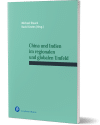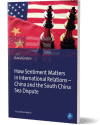Disrespect experiences and the advocacy of cooperative measures?
by David Groten
How Sentiment Matters in International Relations: China and the South China Sea Dispute, pp. 301-304
5.4 Summary of the Core Findings
In overall terms, the overall plausibility of a causal mechanism regarding the role of perceived (dis)respect on FPTT preference formation was confirmed in both sub-cases. While patterns and regularities between 2010 and 2012 affirmed316 a correlation between an absence of disrespect experiences and the advocacy of cooperative measures (correlative pattern I), text segments published since mid-2012 preponderantly underscored a correlation between a strong presence of disrespect experiences and the endorsement of measures of conditional-cooperation or even non-cooperation (correlative pattern II). While this finding was largely unequivocal317 and sufficed to account for descriptive inference, the causal inference was also deemed plausible. Accordingly, the observed shift from correlative pattern I to pattern II, particularly with respect to the changing value of the independent variable from cooperation to limited cooperation and non-cooperation, was plausibly traced back to a significant increase in disrespect experiences over time. Specifically, it was found that the level of cooperation advocated, on average, was particularly low a) the higher the perceived status inappropriateness, b) the more provocative and deliberate, hence humiliating that countries’ conduct vis-à-vis China, c) the more profound the assumed adverse effect on Chinese non-material needs and rights (especially regarding status/identity conceptions and sovereignty rights) and d) the higher the costs of inaction and restraint. In
other words, negative emotions318 aroused by disrespect, a “categorical insistence on legitimate rights319 or status claims”320 (Wolf, 2011, pp. 133-134), and the perceived risk and disadvantages (on China’s self-worth, self-respect (face) and public image) associated with inaction or a continued policy of restraint and cooperation appeared to have triggered the proposition of assertive SCS measures as of mid-2012. Moreover, psychological effects of anger and injustice, especially mounting negativity bias, risk-taking and lack of empathy additionally contributed to the increased withdrawal from (unconditional) cooperation and restraint.
Conversely, the endorsed level of cooperation proved to be higher the fewer disrespect experiences made: more specifically, a) low levels of (status) inappropriateness, b) sparse adverse emotions (incl. humiliation) c) significant recognition of Chinese sovereignty claims, status conceptions and other nonmaterial needs revolving around self-worth and prestige and d) lower costs implied with inaction/cooperation proved favorable for the endorsement of cooperative policy measures.
In a similar vein, growing levels of status self-perception, this project’s intervening variable, was found to have further facilitated the shift from correlative pattern I to II. Chinese FPTT scholars, it seems, are increasingly respect-sensitive (incl. status) and in need of external confirmation of their country’s enhanced status and importance, even though China’s growing influence would have suggested otherwise. At the same time, status and respect needs and expectations are also on the rise, leading to a widening of status gaps and, ultimately an increasing likelihood of future disrespect experiences and status conflicts. Contrariwise, other variables such as security and economic interests have been very much silenced by more respect-related considerations and are not capable of providing a fully-fledged explanation of the shift. That said, while causal inference is plausible, a causal mechanism cannot be validated with certainty due to variance and deviation. Thus, an accurate determination of (dis)respect as the one and only key variable accounting for the shift from pattern I to pattern II over time accompanied by an increasing forcefulness reflected in FPTT rhetoric is not feasible. Alternate variables such as security and power, no matter how relevant, cannot be entirely neglected either, not least as they are inseparably linked with the respect concept at hand, which is not strictly limited to evaluative respect needs but acknowledges the close and mutually reinforcing link between evaluative and non-evaluative dimensions. Similarly, even though certain strategic and material calculations neither could, nor were intended to be, strictly separated from respect-related objectives, re-establishment of respect and, to a slightly lesser degree, education of the offender were both confirmed as core objectives of retaliatory measures predominantly supported from mid-2012 on.
In general, however, Chinese FPTT analysts’ respect sensitivity regarding the conduct of both the U.S and the Philippines turned out as profound and pervasive as their insensitivity regarding possible ramifications of China’s words and deeds on the respect needs of the two other countries. This insensitivity was found to be particularly reflected in the articulated policy preferences and the types of policy measures suggested by Chinese analysts in response. That said, despite certain methodological limitations, it can reasonably be held that the timing321 of the shift, its simultaneous presence in both sub-cases, the very nature of identified underlying arguments, explanations and objectives (cf. criteria A‒D) and the limited explanatory power of alternate variables, all back the assessment that it is highly plausible that an increase in disrespect experiences has significantly contributed to the growing propensity of FPTT scholars to advocate retaliatory policy measures in the SCS. This finding is supported by Sun Xuefeng who holds that “Chinese assertiveness rather [is] a response to mistakes by its neighbors in the SCS” (Sun Xuefeng, personal communication, June 29, 2017). Likewise, Qin Yaqing underlines: “[W]hen a Chinese person feels that they have lost mianzi, their self-esteem will be hurt, and balance in emotion and even in life will also be lost. Therefore, Chinese do not only maintain mianzi passively; they also try to elevate mianzi proactively” (2011, p. 52).
Over and above the confirmation of both correlative patterns and the significance of respect and disrespect effects, these findings run counter to preliminary studies’ results and arguments, particularly to those of scholars stressing that respect terminology is applied in official PRC foreign diplomacy simply as an instrument, a means to achieve certain political objectives, instead of constituting a sentiment of any deeper meaning. Furthermore, the result that a majority of text segments did, in contrast to official PRC documents, not literally articulate a shortfall in respect but first required initial identification and examination of disrespect dynamics, further back the observation that the dismissal of respect as a mere instrument is neither useful nor accurate. Likewise, affirmed plausibility of a causal inference between absence of disrespect experiences, lack of empathy, and non-recognition, on the one hand, and non-cooperation, on the other hand, contradicts a range of other studies on the SCS, which contend that China’s SCS policy is largely motivated and influenced by security concerns, military strategy, power interests and economic interests alone.
Altogether, independent analysis of these two two sub-cases has not just brought to the fore a number of intriguing disparities (e.g. status expectations, advocated type of measures, explanations provided and objectives pursued) but most importantly has added to the level of plausibility, hence positively contributing to the degree of implications that can be derived from this project’s core findings despite restricted empirical generalizability, particularly with regard to the development of China’s SCS policy, the future of the SCS dispute and, to a lesser extent, dynamics of international cooperation at large. These implications are subject to debate in the consecutive chapter.
316 With the exception of the time period mid-2016 until end of 2016 in sub-case II.
317 Despite the finding that some text segments failed to satisfy at least one of the criteria A‒D. This is often for mere methodological reasons, particularly the researcher’s decision to set the maximum size of a single text segment (analytical unit) to one paragraph. Naturally, this limited scope constrains the amount of information that can be subjected to analysis. On several occasions text segments failed to fulfil certain criteria solely because the offender/offense was referred to in the paragraphs preceding or succeeding the actual text segment extracted.
318 Hence, the results very much correspond to findings, among others by Allred et al. (1997), emphasizing that a strong sense of anger diminishes actors’ willingness to cooperate.
319 To reiterate, research in the field of recognition yields that perceived violation or neglect of a country’s sovereignty may fuel aggressive policy measures (Lindemann, 2010, p. 6).
320 Volgy et al. (2011) contend that struggles and resulting uncertainties over status tend to be solved by assertive competition rather than cooperation.
321 As the identified prevailing offenses relate to policy measures that launched between late 2011 and 2013 (or even 2014 to include the EDCA and the initiation of U.S. FONOPs in the SCS), it is not surprising, given the presumed correlation between disrespect and policy recommendations, that a shift in policy preference can be observed at that point in time.
***
David Groten at Budrich:


How Sentiment Matters in International Relations: China and the South China Sea Dispute.
Michael Staack, David Groten (eds.) 2018: China und Indien im regionalen Umfeld.
© Unsplash 2022 / Christian Lue

